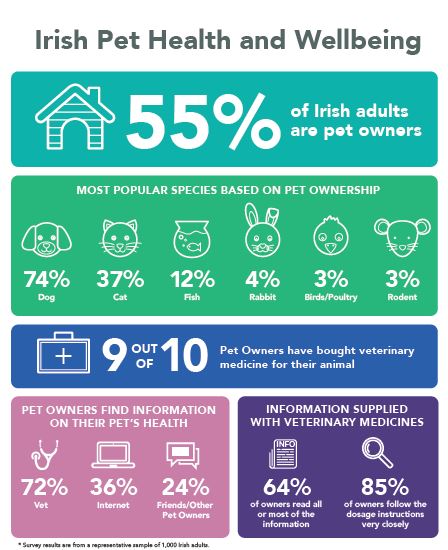News Category: Press release
Majority of pet owners take great care when giving medicines to their pets.
However 1 in 10 owners do not read the product information provided with medicines
The vast majority of Irish pet owners take great care when giving veterinary medicines to their pets, a survey reveals today. New research from the Health Products Regulatory Authority (HPRA) shows that 85% of owners follow the dosage instructions provided very closely, with only 4% admitting to not paying close attention to this important advice. Encouragingly, 3 out of 5 pet owners (64%) reported that they read either all or most of the printed information supplied with veterinary medicines. Of concern, however, is that 1 in 10 (9%) pet owners admit to never reading this information or, at best, only glancing at it.
The HPRA research also highlights the confidence and trust pet owners have in veterinary practitioners, with 7 out of 10 pet owners (72%) seeking well-being advice from their vet, with the internet being the second most used source (36%).
Other findings include:
- Over half of the Irish adult population (55%) are pet owners.
- Seven out of 10 (74%) pet owners have dogs, with almost 4 out of 10 (37%) owning cats. One out of 10 (12%) own fish; with rabbits representing just 4% of ownership.
- Nine out of ten pet owners have purchased medicine for their animals, with wormers (61%), flea treatment (46%) and antibiotics (37%) being the most common treatments.
- One in 10 (12%) say they have never bought a veterinary medicine for their pet.

*Download HPRA infographic - Irish Pet Health and Wellbeing
Commenting on the research, Dr Gabriel Beechinor, HPRA Director of Veterinary Sciences, stated that veterinary medicines are important and valuable products to maintain a pets’ well-being and to cure illnesses.
‘It is positive that the majority of Irish pet owners are cautious and responsible when they are administering veterinary medicines to their pets. The product information that comes with a medicine includes very important details such as the recommended dose, instructions for use and storage, as well as potential side effects. We would advise anyone giving a medicine to an animal under their care to read this information carefully. For those who ignore this information, we must stress that they could be putting the health of their pets at risk. At a minimum, the issue or illness they are attempting to treat could persist for far longer than is necessary.”
‘We also welcome the fact that pet owners continue to trust and rely on their veterinary professional for expert advice about the health of their animals. The internet is an instantly accessible information and research tool which can of course be of assistance to pet owners but we would urge them to be cautious about making health and treatment decisions based on online information that may not be evidence-based or reliable."
The role of the HPRA is to make sure that veterinary medicines are as safe as possible and do what they are supposed to do. As well as authorising veterinary medicines following a review of their safety, quality and effectiveness, the HPRA is also responsible for the continued monitoring of safety, quality and effectiveness once the medicines are on the market. The publication of today’s research coincides with a call from the HPRA to pet owners to always monitor their animals for potential side effects or adverse events that could arise following the use of a veterinary medicine. Where a pet owner suspects that an animal has experienced a side effect, or if they suspect the medicine did not work as intended, they can report this to the HPRA.
According to Dr Beechinor, the HPRA is committed to ensuring that pet owners have access to medicines that are as safe and effective as possible. “An important part of this is hearing about potential adverse reactions that owners may have observed while their pet is on a medicine. Owners may find it helpful to consult with their vet about the potential reaction in the first instance and together they can make the decision whether to report it to the HPRA. Alternatively, pet owners can report directly to us themselves using our online or printed report forms. The information we receive about possible reactions is valuable and helps us to monitor veterinary medicines on a continuous basis.”
The HPRA operates a national pharmacovigilance system which monitors adverse drug reactions to veterinary medicines reported by marketing authorisation holders, veterinary practitioners, pharmacists, licensed merchants and animal owners. An online report form is available on www.hpra.ie while copies of the form can also be printed and sent by post. The HPRA has also published a guidance leaflet Reporting Adverse Events – Our Advice which can be downloaded for free from its website.
ENDS
FOR FURTHER INFORMATION:
Weber Shandwick PR (01) 679 8600
Siobhan Molloy/Rachel Galligan (086) 817 5066 / (087) 791 9901
ABOUT THE HEALTH PRODUCTS REGULATORY AUTHORITY
The Health Products Regulatory Authority (HPRA) protects and enhances public health and animal health by regulating medicines, medical devices and other health products. The products under its remit include human and veterinary medicines, medical devices, blood and blood components, tissues and cells, organs for transplantation and cosmetics.